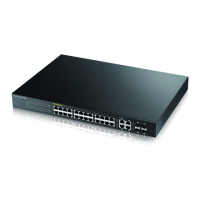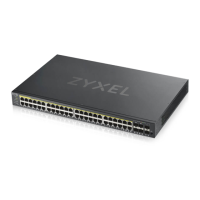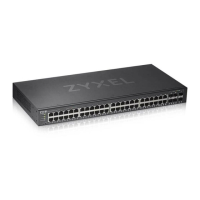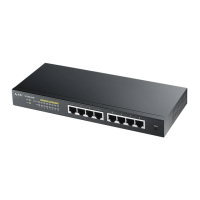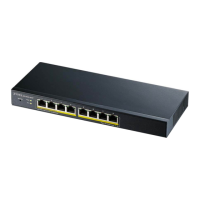Chapter 39 Access Control
GS1920 Series User’s Guide
341
39.7.2 Introduction to HTTPS
HTTPS (HyperText Transfer Protocol over Secure Socket Layer, or HTTP over SSL) is a web protocol
that encrypts and decrypts web pages. Secure Socket Layer (SSL) is an application-level protocol
that enables secure transactions of data by ensuring confidentiality (an unauthorized party cannot
read the transferred data), authentication (one party can identify the other party) and data
integrity (you know if data has been changed).
It relies upon certificates, public keys, and private keys.
HTTPS on the Switch is used so that you may securely access the Switch using the web
configurator. The SSL protocol specifies that the SSL server (the Switch) must always authenticate
itself to the SSL client (the computer which requests the HTTPS connection with the Switch),
whereas the SSL client only should authenticate itself when the SSL server requires it to do so.
Authenticating client certificates is optional and if selected means the SSL-client must send the
Table 171 SNMP AAA Traps
OPTION OBJECT LABEL OBJECT ID DESCRIPTION
authentication authenticationFailure 1.3.6.1.6.3.1.1.5.5 This trap is sent when authentication
fails due to incorrect user name and/
or password.
Table 172 SNMP IP Traps
OPTION OBJECT LABEL OBJECT ID DESCRIPTION
ping pingProbeFailed 1.3.6.1.2.1.80.0.1 This trap is sent when a single ping probe fails.
pingTestFailed 1.3.6.1.2.1.80.0.2 This trap is sent when a ping test (consisting of a
series of ping probes) fails.
pingTestCompleted 1.3.6.1.2.1.80.0.3 This trap is sent when a ping test is completed.
traceroute traceRouteTestFailed 1.3.6.1.2.1.81.0.2 This trap is sent when a traceroute test fails.
traceRouteTestCompleted 1.3.6.1.2.1.81.0.3 This trap is sent when a traceroute test is completed.
Table 173 SNMP Switch Traps
OPTION OBJECT LABEL OBJECT ID DESCRIPTION
stp STPNewRoot 1.3.6.1.2.1.17.0.1 This trap is sent when the STP root switch changes.
STPTopologyChange 1.3.6.1.2.1.17.0.2 This trap is sent when the STP topology changes.
rmon RmonRisingAlarm 1.3.6.1.2.1.16.0.1 This trap is sent when a variable goes over the RMON
"rising" threshold.
RmonFallingAlarm 1.3.6.1.2.1.16.0.2 This trap is sent when the variable falls below the
RMON "falling" threshold.
cfm dot1agCfmFaultAlarm 1.3.111.2.802.1.1.8.
0.1
The trap is sent when the Switch detects a
connectivity fault.

